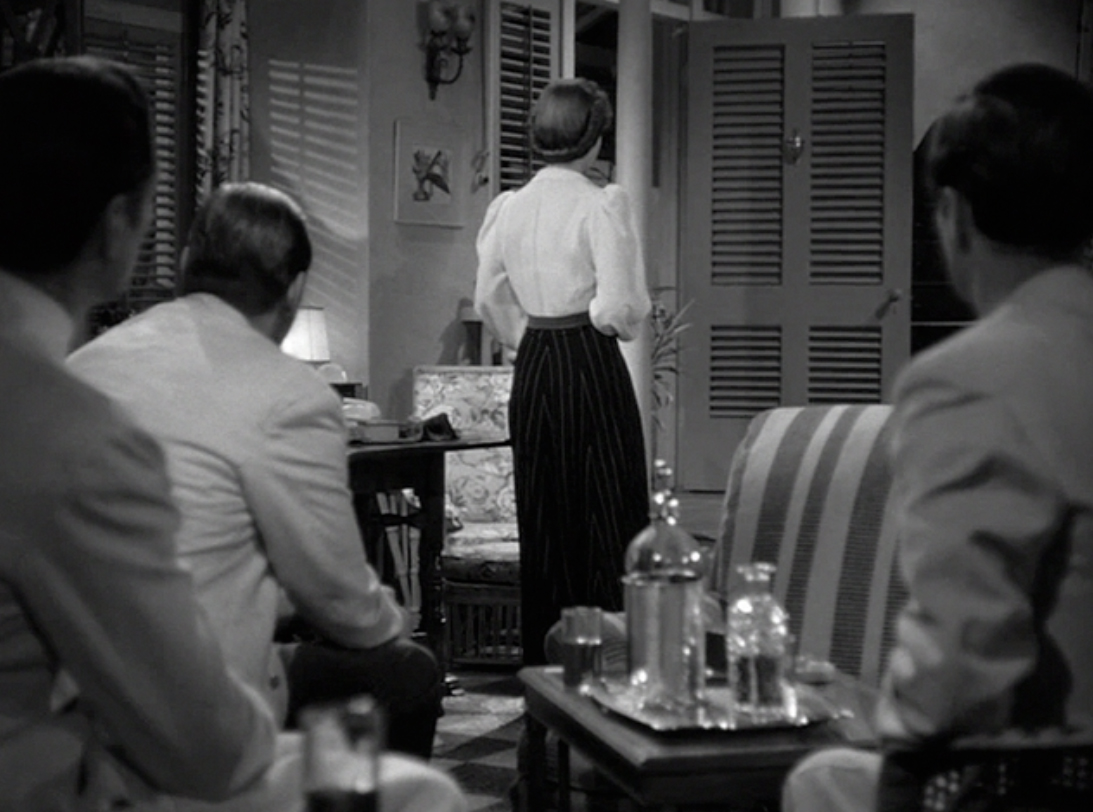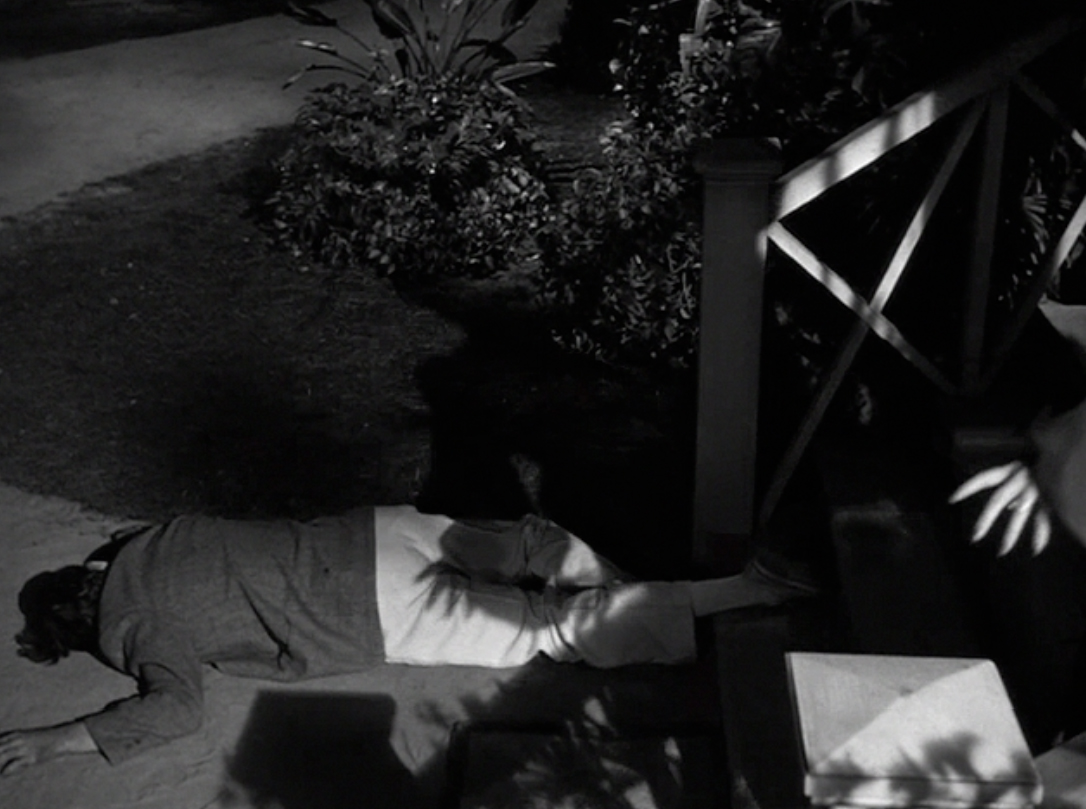Seasons of Bette: The Letter (1940)
 Tuesday, April 15, 2014 at 11:10PM
Tuesday, April 15, 2014 at 11:10PM Multi-tasking again. Herewith a new episode of three recurring series: Seasons of Bette, "Introducing..." and Hit Me With Your Best Shot in which I, Nathaniel, refuse to show you Bette Davis's face. For here's a perverse truth: none of my three favorite shots of The Letter (1940) include it.
 honorable mention: Leslie recounts her crime
honorable mention: Leslie recounts her crime
Pt. 1 "Introducing..."
Meet Leslie Crosbee, murderess. We're only one minute into the movie when she unloads six shots purposefully nto the back of one Geoff Hammond who is attempting to escape her house. He doesn't make it beyond the foot of her steps. Her face is a frozen severe mask as she drops the gun. It's Bette Davis's most potent entrance into a movie yet.
Where the hell do you go after your protagonist makes an entrance like that? To her confession, as it turns out. William Wyler, here adapting a play by W. Somerset Maugham, is appreciated today mostly as a great actor's director, but he's so much more than that. He's not content to rest on the power of his actors alone, despite the three Oscars and multiple nominations they'd already received at this point. In one of his boldest moves, he even lets the entire cast turn their backs on us -- this movie is cold -- while Mrs Crosbee calmly recounts an attempted rape and the resultant murder in great detail. The camera (cinematography by Oscar favorite Tony Gaudio) becomes a kind of detached slave, following Bette's vocal cue and showing us now vacant rooms, steps and floorboards, as if it exists only as an empty stage for her drama. Given how rapturously and literally shady our leading lady is (oh the sinister cast shadows of film noir!) it's not much of a spoiler to tell you that she's a liar.
 best shot: the equally shady widow
best shot: the equally shady widow
Pt. 2 Best Shot
The title character in this noir, is an incriminating letter written by Leslie which is in the possession of Mr Hammond's mysterious Asian wife (Gale Sondegaard in "yellow face"). The movie is casually racist, a product of its time, or at least suggestive of the casual racism of its time. Leslie's lawyer remark that Hammond's marriage to this woman, immediately makes the colonist of questionable character and thus presumed guilty of the rape Leslie has accused him of. And Leslie herself is the most verbally racist of the film's characters, grotesquely repulsed by Mrs. Hammond
Then i heard about that -- that native woman Oh, I couldn't believe it. i wouldn't believe it. I saw her walking in the village with those hideous spangles, that chalky painted face, those eyes like a cobra's eyes.
But fortunately for the film, this fetishistic attention to Mrs Hammond's "exoticism" in any scene in which she appears actually serves to level the playing field. That's especially true of this scene which is tricked up in every way possible with "Asian" signifiers in the scoring, decor, and "dragon lady" costuming (it's worth noting that Mrs Hammond is the only Asian in the film costumed and presented this way as if she's barely real at all but a projection of Leslie's own jealous and racist obsession with her). And in this case, doesn't one have to excuse or even applaud all the exoticism? If you're going to engage in an epic staredown with Bette Davis in which she must suddenly be cowered by you, you'd better bring it by any means necessary. Sondegaard and the cinematography do.
In a curious way, though, The Letter's most fascinating character is the man with six bullets in his back. What kind of a man could own the vengeful hearts of two such lethal women? In his own stiff way he's the perfect embodiment of film noir's powerfully confusing phobic relationship to the female gender. It loves them like no other genre while also living in perpetual fear of their power and agency.
 runner up shot: Guadio & Wyler find several great uses for Bette's hands in this film. I love her fingerprints grazing her victim here.
runner up shot: Guadio & Wyler find several great uses for Bette's hands in this film. I love her fingerprints grazing her victim here.
To be Continued...
Tonight at 10 PM we'll post the visual index of all Best Shot entries for this famous noir.
Thursday Seasons of Bette continues, back-tracking one year for Dark Victory since we fell behind.



Reader Comments (6)
Excellent choices in a film with so many possibilities. My choice would be right after Bette has gunned down Geoff Hammond and her houseboy walks up behind her. She turns, the moonlight catches her eyes and in them you can see the caged dangerous animal lurking underneath that she keeps hidden throughout the film. It's only for an instant but it's a powerful early clue to what lies ahead. It a great moment that captures the power of those Bette Davis eyes.
Love you mentioning of Bette's hands, Wyler also highlights Gale Sondegaard's hands at different times. His direction is so assured in this film never letting up on the tension for an instance. How did Warners get the scene in what is obviously an opium den passed the production code?
I've seen all the other versions, the original with Jeanne Eagles, the reworking with Ann Sheridan renamed The Unfaithful and Lee Remick's TV remake. All have interesting pieces and all the ladies do good work with the character but none hold a candle to this version or Bette.
Great Post! I honestly think this is one of the best Bette Davis performances I've ever seen, and this is coming from someone who adores "All About Eve".
Not knowing where else to put this and wanting to get my pick in early, I've posted my own best shot at my journal, under the heading "Actions Speak Louder Than Words, but They're Often Driven by Them as Well."
Sometimes I think this is her most essential performance. Until I change my mind.
This movie is simply gorgeous. Gaudio really shows his stuff here. Bette's performance is stunning. Third of five consecutive Best Actress nods. Wyler's first true masterpiece. There would be quite a few more to come.
If I had to pick a fave shot, which ain't easy, it's Bette's resignation shown in close-up when she decides to intentionally to go into the garden. To her fate.
this is one bette davis films i had not sen yet and i absolutely loved it! great post and love your choices, nathaniel. i almost went with mrs. hammond's entrance as well and also toyed with the shot of her hands bedecked with her "hideous spangles" and elaborate rings as she twists the letter with contempt in front of leslie. her character may be a stereotypical dragon lady, but i'm willing to forgive it because she looks so fabulous. especially next to leslie's virginal lace shawl, which ain't foolin' anyone...
Wonderful post. I'm always surprised when this movie isn't included at the top of her most famous/iconic performances (Jezebel, Dark Victory, Now, Voyager, All About Eve, etc) -- maybe it's because the character is so unsympathetic?
Whatever the reason -- imagine another actress playing a nasty piece of work with such integrity. My personal favorite scene (beyond the opening one) is her final confession to her husband (a nice, dumb Herbert Marshall) -- "I still love the man I murdered!" (can't remember the exact line). There's an interesting anecdote out there about Wyler's direction for that scene vs Davis' instincts... can't remember the actual story.
Wonderful, dark, hauntingly modern film with a true magnetic star performance as its centerpiece.